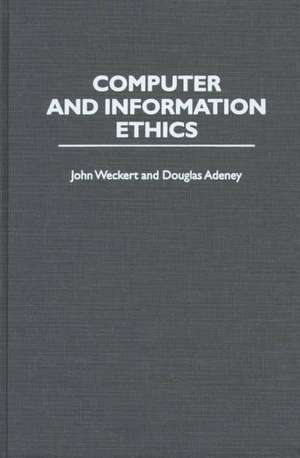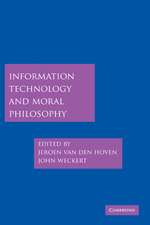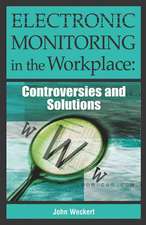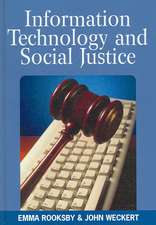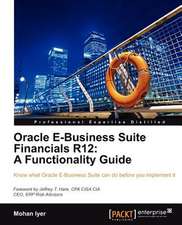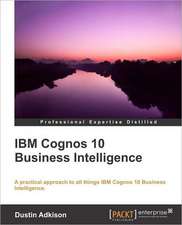Computer and Information Ethics: Contributions to the Study of Computer Science
Autor Douglas Adeney, John Weckerten Limba Engleză Hardback – 27 mai 1997 – vârsta până la 17 ani
Preț: 346.34 lei
Preț vechi: 476.63 lei
-27% Nou
Puncte Express: 520
Preț estimativ în valută:
66.28€ • 68.94$ • 54.72£
66.28€ • 68.94$ • 54.72£
Carte tipărită la comandă
Livrare economică 14-28 aprilie
Preluare comenzi: 021 569.72.76
Specificații
ISBN-13: 9780313293627
ISBN-10: 0313293627
Pagini: 192
Dimensiuni: 156 x 235 x 15 mm
Greutate: 0.48 kg
Editura: Bloomsbury Publishing
Colecția Praeger
Seria Contributions to the Study of Computer Science
Locul publicării:New York, United States
ISBN-10: 0313293627
Pagini: 192
Dimensiuni: 156 x 235 x 15 mm
Greutate: 0.48 kg
Editura: Bloomsbury Publishing
Colecția Praeger
Seria Contributions to the Study of Computer Science
Locul publicării:New York, United States
Notă biografică
John Weckert is senior lecturer in information technology at Charles Sturt University in Australia. He has an BA from the University of Adelaide, an MA from La Trobe University, and a PhD from the University of Melbourne. His main teaching and research interests are in the field of artificial intelligence, especially knowledge-based systems, and computer ethics.Douglas Adeney is lecturer in philosophy at the University of Melbourne. He has an MA from Monash University and a PhD from the University of St. Andrews. His main teaching and research interests are in moral and political philosophy, and he additionally enjoys teaching in the areas of general metaphysics and logic.
Cuprins
IntroductionThe Meaning of EthicsProfessional EthicsFreedom, Information, and ImagesCensorship of the InternetIntellectual PropertyPrivacyResponsibilityWhat Computers Should Not DoQuality of Life and WorkVirtual RealityMinds, Machines, and MoralityGlossaryBibliographyIndex
Recenzii
Today, the widespread use of computers forces new evaluations of intellectual property ethics, censorship on the Internet, libel and deceit through both texts and doctored images, and the rights of inanimate entities such as software agents. This book is the joint product of a computer technologist and a philsopher; as such; it is authoritative on both perspectives. The writing is extremely clear and not highly technical, and the material very timely and fascinating. Topics discussed include the meaning of ethics; professional ethics, images; censorship on the Internet, intellectual property; privacy; responsibility; what computers should not do; quality of life and work; virtual reality; and machines and morality. An excellent introduction.
This is a well-reasoned, closely written, highly practical volume attempting to cover serious problems of an industry that has grown from virtually nothing to an ubiquitous, all-powerful influence in one human's lifetime. . . . The book is very well-written, making it possible for the layman to understand complex concepts. While it may not be the last word in computer and information ethics, it may well serve as one of the foundations of a much needed field.
[A]n excellent monograph that addresses the issues surrounding computer and information ethics. . . . [T]he authors do an excellent job in putting together a balanced work that does nore than just skin the surface. Each ethical and philosophical viewpoint is given equal time, and efforts are made to answer the myriad of questions posed. For the librarian or information professional who wants to take a step deeper into the issues relating to computer and information ethics, this book is a great starting point.
The style is informative and practical, and the authors make clear their views on what is important (e.g. ensuring freedom of speech) and what is not (e.g., is librarianship or computer science a profession?), setting forth an agenda for inquiry and further study that avoids pretentiousness and is frequently humorous. As such, this book serves its intended purpose admirably, and is a welcome addition to the literature.
Reading it is like eavesdropping on philosphers at work: the authors actually reason about things, going back and forth about what might be acceptable or good in a given situation. It is this slice of life quality that makes the book interesting and valuable as a new contribution to information ethics. . . . Computer and Information Ethics is well written and interesting to read. I highly recommend it.
This is a well-reasoned, closely written, highly practical volume attempting to cover serious problems of an industry that has grown from virtually nothing to an ubiquitous, all-powerful influence in one human's lifetime. . . . The book is very well-written, making it possible for the layman to understand complex concepts. While it may not be the last word in computer and information ethics, it may well serve as one of the foundations of a much needed field.
[A]n excellent monograph that addresses the issues surrounding computer and information ethics. . . . [T]he authors do an excellent job in putting together a balanced work that does nore than just skin the surface. Each ethical and philosophical viewpoint is given equal time, and efforts are made to answer the myriad of questions posed. For the librarian or information professional who wants to take a step deeper into the issues relating to computer and information ethics, this book is a great starting point.
The style is informative and practical, and the authors make clear their views on what is important (e.g. ensuring freedom of speech) and what is not (e.g., is librarianship or computer science a profession?), setting forth an agenda for inquiry and further study that avoids pretentiousness and is frequently humorous. As such, this book serves its intended purpose admirably, and is a welcome addition to the literature.
Reading it is like eavesdropping on philosphers at work: the authors actually reason about things, going back and forth about what might be acceptable or good in a given situation. It is this slice of life quality that makes the book interesting and valuable as a new contribution to information ethics. . . . Computer and Information Ethics is well written and interesting to read. I highly recommend it.
